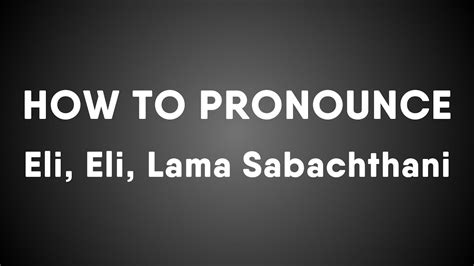The phrase "Eli, Eli, Lama Sabachthani" is a well-known biblical quote from the New Testament, specifically from the Gospel of Matthew (27:46) and the Gospel of Mark (15:34). It is a cry of Jesus Christ as he hung on the cross. Understanding the correct pronunciation of this phrase can be challenging, but breaking it down into steps can help.
Step 1: Understanding the Language and Context The phrase "Eli, Eli, Lama Sabachthani" is in Aramaic, a language spoken in the region of Galilee where Jesus lived and preached. The quote is part of the last words of Jesus Christ on the cross, reflecting his feelings of abandonment and questioning of God's presence in his suffering.
Step 2: Breaking Down the Phrase Let's break down the phrase into its individual components to understand its pronunciation better:
- Eli: This is a name for God, akin to the Hebrew "Elohim" but in the Aramaic dialect. The pronunciation is similar to "Ay-lee".
- Lama: This word means "why" or "for what" and is pronounced as "Lah-mah".
- Sabachthani: This is a bit more complex and translates to "have you forsaken me" or "have you left me". The pronunciation is close to "Sab-akh-thah-nee".
Step 3: Combining the Parts Combining the individual words to get the full phrase's pronunciation: "Ay-lee, Ay-lee, Lah-mah Sab-akh-thah-nee".
Step 4: Practicing the Pronunciation Practice makes perfect. Repeat the phrase several times to get a feel for how the words flow together. Pay special attention to the stress and rhythm of the phrase, as these can affect its overall pronunciation.
Step 5: Listening to Audio Resources To confirm your pronunciation, listen to audio recordings of the phrase, especially those spoken by native Aramaic speakers or scholars familiar with the language. This can provide a more accurate model for your own pronunciation.

In conclusion, mastering the pronunciation of "Eli, Eli, Lama Sabachthani" requires a combination of understanding the context, breaking down the phrase, practicing the individual components, combining them correctly, and verifying with audio resources. This approach can help anyone improve their pronunciation of this significant biblical quote.





What is the significance of "Eli, Eli, Lama Sabachthani" in the Bible?
+"Eli, Eli, Lama Sabachthani" is a cry of Jesus Christ on the cross, expressing his feeling of abandonment and questioning of God's presence in his suffering, marking a pivotal moment in the Christian narrative.
Why is it important to understand the pronunciation of biblical phrases?
+Understanding the correct pronunciation of biblical phrases can deepen one's understanding and connection to the text, as well as enhance the authenticity of worship and study practices.
What resources can help with learning Aramaic pronunciation?
+Resources include language learning apps, YouTube tutorials, academic courses, and listening to recordings by native speakers or scholars. Practicing with a community or tutor can also be beneficial.
Share your thoughts and experiences with learning biblical languages and their pronunciations. How do you practice and improve your understanding of these languages?
